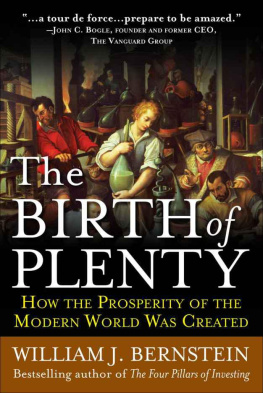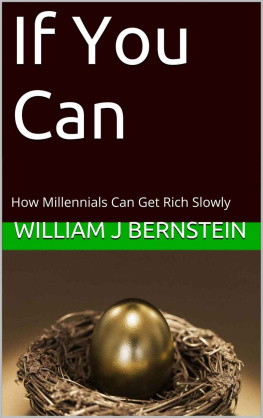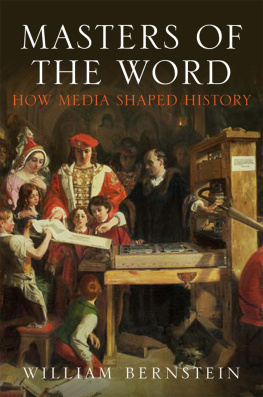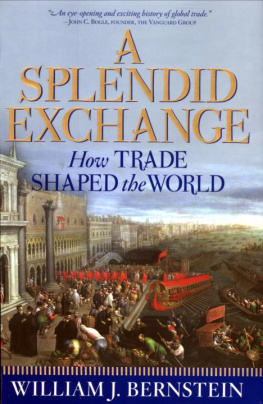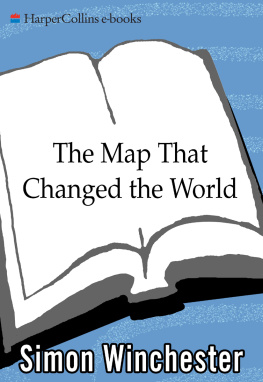William Bernstein - The Birth of Plenty: How the Prosperity of the Modern World was Created
Here you can read online William Bernstein - The Birth of Plenty: How the Prosperity of the Modern World was Created full text of the book (entire story) in english for free. Download pdf and epub, get meaning, cover and reviews about this ebook. year: 2010, publisher: McGraw-Hill, genre: Romance novel. Description of the work, (preface) as well as reviews are available. Best literature library LitArk.com created for fans of good reading and offers a wide selection of genres:
Romance novel
Science fiction
Adventure
Detective
Science
History
Home and family
Prose
Art
Politics
Computer
Non-fiction
Religion
Business
Children
Humor
Choose a favorite category and find really read worthwhile books. Enjoy immersion in the world of imagination, feel the emotions of the characters or learn something new for yourself, make an fascinating discovery.
- Book:The Birth of Plenty: How the Prosperity of the Modern World was Created
- Author:
- Publisher:McGraw-Hill
- Genre:
- Year:2010
- Rating:3 / 5
- Favourites:Add to favourites
- Your mark:
- 60
- 1
- 2
- 3
- 4
- 5
The Birth of Plenty: How the Prosperity of the Modern World was Created: summary, description and annotation
We offer to read an annotation, description, summary or preface (depends on what the author of the book "The Birth of Plenty: How the Prosperity of the Modern World was Created" wrote himself). If you haven't found the necessary information about the book — write in the comments, we will try to find it.
The Birth of Plenty: How the Prosperity of the Modern World was Created — read online for free the complete book (whole text) full work
Below is the text of the book, divided by pages. System saving the place of the last page read, allows you to conveniently read the book "The Birth of Plenty: How the Prosperity of the Modern World was Created" online for free, without having to search again every time where you left off. Put a bookmark, and you can go to the page where you finished reading at any time.
Font size:
Interval:
Bookmark:
THE BIRTH OF PLENTY
How the Prosperity of the Modern World Was Created
WILLIAM J. BERNSTEIN


Copyright 2004 by The McGraw-Hill Companies, Inc. All rights reserved. Except as permitted under the United States Copyright Act of 1976, no part of this publication may be reproduced or distributed in any form or by any means, or stored in a database or retrieval system, without the prior written permission of the publisher.
ISBN: 978-0-07-176080-5
MHID: 0-07-176080-6
The material in this eBook also appears in the print version of this title: ISBN: 978-0-07-174704-2, MHID: 0-07-174704-4.
All trademarks are trademarks of their respective owners. Rather than put a trademark symbol after every occurrence of a trademarked name, we use names in an editorial fashion only, and to the benefit of the trademark owner, with no intention of infringement of the trademark. Where such designations appear in this book, they have been printed with initial caps.
McGraw-Hill eBooks are available at special quantity discounts to use as premiums and sales promotions, or for use in corporate training programs. To contact a representative please e-mail us at bulksales@mcgraw-hill.com.
TERMS OF USE
This is a copyrighted work and The McGraw-Hill Companies, Inc. (McGraw-Hill) and its licensors reserve all rights in and to the work. Use of this work is subject to these terms. Except as permitted under the Copyright Act of 1976 and the right to store and retrieve one copy of the work, you may not decompile, disassemble, reverse engineer, reproduce, modify, create derivative works based upon, transmit, distribute, disseminate, sell, publish or sublicense the work or any part of it without McGraw-Hills prior consent. You may use the work for your own noncommercial and personal use; any other use of the work is strictly prohibited. Your right to use the work may be terminated if you fail to comply with these terms.
THE WORK IS PROVIDED AS IS. McGRAW-HILL AND ITS LICENSORS MAKE NO GUARANTEES OR WARRANTIES AS TO THE ACCURACY, ADEQUACY OR COMPLETENESS OF OR RESULTS TO BE OBTAINED FROM USING THE WORK, INCLUDING ANY INFORMATION THAT CAN BE ACCESSED THROUGH THE WORK VIA HYPERLINK OR OTHERWISE, AND EXPRESSLY DISCLAIM ANY WARRANTY, EXPRESS OR IMPLIED, INCLUDING BUT NOT LIMITED TO IMPLIED WARRANTIES OF MERCHANTABILITY OR FITNESS FOR A PARTICULAR PURPOSE. McGraw-Hill and its licensors do not warrant or guarantee that the functions contained in the work will meet your requirements or that its operation will be uninterrupted or error free. Neither McGraw-Hill nor its licensors shall be liable to you or anyone else for any inaccuracy, error or omission, regardless of cause, in the work or for any damages resulting there from. McGraw-Hill has no responsibility for the content of any information accessed through the work. Under no circumstances shall McGraw-Hill and/or its licensors be liable for any indirect, incidental, special, punitive, consequential or similar damages that result from the use of or inability to use the work, even if any of them has been advised of the possibility of such damages. This limitation of liability shall apply to any claim or cause whatsoever whether such claim or cause arises in contract, tort or otherwise.
WHEN MY WIFE BROUGHT P.J.ORourkes Eat the Rich home from the library a decade ago, a few years before McGraw-Hill published the 2002 hardcover edition of this book, I wasnt expecting much in the way of historical insight. Mr. ORourke aims to amuse, and his lighthearted romp through the worlds economic success and sob stories did not disappoint, most memorably his exposition of credit risk: A junk bond is a loan to your little brother; a high-quality bond is a loan to your little brother by the Gambino family.
Mr. ORourkes frothy prose hides painstaking legwork. Scattered among the quips are some well-researched passages, including one that briefly mentioned data assembled by an obscure Scottish economist named Angus Maddison, who found a startling discontinuity in world economic growth around 1820: Before that date, growth was essentially nonexistent; after that date, it was sustained and vigorous.
It took me a while to rustle up a copy of Maddisons summary work, Monitoring the World Economy, 18201992. The bound edition looks as dull and as daunting as the densest legal brief, but inside, Maddisons dry data lay out the greatest story ever told: the economic birth of the modern world. The finest written rendition of Japans Meiji Restoration and post-World War II prosperity does not do justice to the raw numbers presented in Maddisons book: six percent inflation-adjusted growth in Japanese per capita GDP, a doubling of average life span, a near-quadrupling of educational levels, and the rapid disappearance of illiteracy, all in the four decades before World War I.
I became fascinated with this sudden change in the Western worlds fortunes. Maddison himself made a half-hearted stab at explanation, briefly mentioning technologic progress; improvements in trade, finance, and human capital; and the exploitation of natural resourcesas well as referring to more obscure economic concepts such as growth accounting. None of these satisfied me. That belief that technologic change produces economic improvement explains nothing. Almost by definition, economic growth is the child of technological innovation. Were advances in electronics, transportation, and the sciences to suddenly cease, the only way to increase economic efficiency would be through improvements in the specialization of labor; beyond this, economic growth would stop.
The question gnawed at me: Why? Why did world economic growth, and the technologic progress underlying it, suddenly explode when it did? Why didnt the Florentines invent the steam engines and flying machines that da Vinci sketched? Why didnt the Romans, with their metallurgical skills, discover electricity and invent the telegraph? Why didnt the Greeks, with their expertise in mathematics, describe the laws of probability, without which modern capital markets cannot function? For that matter, why did the Athenians remain relatively poor for the century and a half between their defeat of the Persians and their envelopment by Alexander, when they possessed the commonly recognized conditions for economic growth: democracy, property rights, free markets, and a free middle class? Most important of all, why did Hobbess description of life in a state of nature as solitary, poor, nasty, brutish, and shortwords that perfectly captured what life was like for the majority of people until the nineteenth centurydisappear from Western Europe less than two centuries after it was set down on paper?
Paul Johnson comes as close as anyone to answering these questions in The Birth of the Modern. His description of the revolutions in the sciences, politics, literature, and the arts at the beginning of the nineteenth century is nonpareil, a wonderful prose counterpart to Maddisons workEarly Modern Developmental History for Poets, if you will. Johnson, however, remained silent on the ultimate question of why this most important of all historical Although Diamonds book provides a breathtaking overview of the biological and geographic players in human history, its answer to the tribesmans plaintive querythat geography, climate, and microbiological exposure determine historical dominancemakes little historical and economic sense. After all, geography and climate most certainly do not explain the radically different fortunes of North and South Korea. In the same vein, microbiology does not explain the European dominance of much of Asia after 1500, since, as first pointed out by historian William H. McNeill, the pathogen pools of Europe and Asia had largely equilibrated by the middle of the second millennium.
Next pageFont size:
Interval:
Bookmark:
Similar books «The Birth of Plenty: How the Prosperity of the Modern World was Created»
Look at similar books to The Birth of Plenty: How the Prosperity of the Modern World was Created. We have selected literature similar in name and meaning in the hope of providing readers with more options to find new, interesting, not yet read works.
Discussion, reviews of the book The Birth of Plenty: How the Prosperity of the Modern World was Created and just readers' own opinions. Leave your comments, write what you think about the work, its meaning or the main characters. Specify what exactly you liked and what you didn't like, and why you think so.

